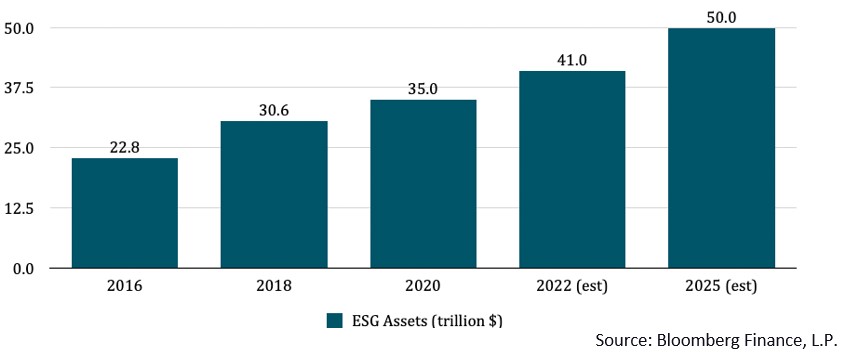In ESG Investing, Money Changes Everything
ESG investors put their money where their mouths (and hearts and minds) are by investing in companies with better management of environmental, social and corporate governance factors.


Profit and prosper with the best of Kiplinger's advice on investing, taxes, retirement, personal finance and much more. Delivered daily. Enter your email in the box and click Sign Me Up.
You are now subscribed
Your newsletter sign-up was successful
Want to add more newsletters?

Delivered daily
Kiplinger Today
Profit and prosper with the best of Kiplinger's advice on investing, taxes, retirement, personal finance and much more delivered daily. Smart money moves start here.

Sent five days a week
Kiplinger A Step Ahead
Get practical help to make better financial decisions in your everyday life, from spending to savings on top deals.

Delivered daily
Kiplinger Closing Bell
Get today's biggest financial and investing headlines delivered to your inbox every day the U.S. stock market is open.

Sent twice a week
Kiplinger Adviser Intel
Financial pros across the country share best practices and fresh tactics to preserve and grow your wealth.

Delivered weekly
Kiplinger Tax Tips
Trim your federal and state tax bills with practical tax-planning and tax-cutting strategies.

Sent twice a week
Kiplinger Retirement Tips
Your twice-a-week guide to planning and enjoying a financially secure and richly rewarding retirement

Sent bimonthly.
Kiplinger Adviser Angle
Insights for advisers, wealth managers and other financial professionals.

Sent twice a week
Kiplinger Investing Weekly
Your twice-a-week roundup of promising stocks, funds, companies and industries you should consider, ones you should avoid, and why.

Sent weekly for six weeks
Kiplinger Invest for Retirement
Your step-by-step six-part series on how to invest for retirement, from devising a successful strategy to exactly which investments to choose.
Cyndi Lauper was not commenting on ESG investing when she sang “Money Changes Everything” in 1984. But she could have been. The entire premise behind ESG investing is to use the power of money to create positive change.
What is ESG? ESG encompasses broad areas that companies routinely impact, for better or worse. Businesses inevitably affect the environment (E) and can develop policies that minimize or neutralize the negative effects or produce positive effects in areas such as carbon emissions, water usage, green energy and pollution, to name a few.
Companies also impact the social (S) element, or the relationships it has with people and institutions in their community — that influence is demonstrated through hiring and labor practices, diversity and inclusion policies, workplace safety and philanthropy.
From just $107.88 $24.99 for Kiplinger Personal Finance
Become a smarter, better informed investor. Subscribe from just $107.88 $24.99, plus get up to 4 Special Issues

Sign up for Kiplinger’s Free Newsletters
Profit and prosper with the best of expert advice on investing, taxes, retirement, personal finance and more - straight to your e-mail.
Profit and prosper with the best of expert advice - straight to your e-mail.
Finally, firms decide on governance (G) — the internal system of practices, procedures and controls for decision-making, governing itself and complying with the law. Governance includes matters such as board diversity, executive pay, business ethics, competitive fairness and financial processes.
ESG Investing Is Growing in Popularity
ESG investing has become an increasingly popular trend, but it’s not just a fad, as ESG assets have been steadily growing for decades now. Globally, ESG investors are increasingly putting their money where their mouths (and hearts and minds) are to the tune of a projected $50 trillion by 2025, up from $35 trillion in 2020. ESG assets represent a third of total global assets under management.

If the money is there, the next question is, is it creating positive change? The answer can be found by looking at examples of how industries and companies have created change with ESG in mind.
- Traditionally, mergers and acquisitions involve a firm making decisions primarily based on whether the target business would increase earnings. Now, firms are increasingly considering ESG priorities when deciding with whom to partner or acquire. For example, companies in the energy sector consider how the deal will benefit them with regard to clean energy, decarbonization targets and supply chains with sustainable sourcing practices.
- J.B. Hunt Transport Services, Inc. sets the bar in making the environment a priority. Its goal is to reduce carbon emission intensity by 32% by 2034 through alternative-powered equipment, more biogenic fuels and better fuel economy. The company also makes use of intermodal shipping, which is more efficient and involves fewer carbon emissions than over-the-road shipping.
- Green investing has incentivized companies like Graphic Packaging Holding Co., a producer of packaging material for food, beverage and consumer-products companies, to shift from producing plastic products to more sustainable paper goods. Changes like this bring us one step closer to a world free of foam cups, plastic takeout containers and six-pack rings.
- A growing number of corporations are issuing impact bonds to meet their ESG goals. In 2022, the agricultural company Archer Daniels Midland (ADM) issued $750 million of bonds with the proceeds going to environmental and social programs. According to the company's website, ADM’s sustainability goals include reducing greenhouse gas emissions by 25%, energy intensity by 15% and water intensity by 10% and achieving a 90% landfill diversion rate, all by 2035.
Just as ESG assets are on the rise, opportunities to invest are likewise growing. The most common way to invest in ESG and be automatically diversified is to choose from the hundreds of ESG mutual funds and ETFs available.
Personalized Indexing Gives Investors More Flexibility
An exciting development, though, is the personalized indexing (PI) option that has more recently emerged.
PI allows an investor to choose exactly which companies will be in their ESG fund, akin to the best Las Vegas casino buffet in investing. An investor could fill a plate with a scoop of wind energy, a dollop of social justice and a sprinkling of gender diversity while actively avoiding any helpings of animal testing or slices of unethical behavior.
This custom-tailored approach ensures the fund will precisely align with the investor’s values, rather than relying on a fund manager’s judgment, as well as provide enhanced opportunities to improve the tax efficiency of the investor’s portfolio.
So Many Choices Can Be Overwhelming
It's always nice to have a choice, and clearly the choices are plentiful when it comes ESG investing. Sometimes, however, those choices can also make investing seem somewhat overwhelming. The most surefire way to make sure your portfolio not only aligns with your values but also meets your overall investment goals is to work with a financial adviser well-versed in ESG.
ESG investors can feel good about intentionally and thoughtfully using their dollars to make a difference. ESG investing provides the opportunity to receive a return on an investment while prioritizing the environment, people and ethics at the same time.
Without ESG, would some companies independently create change on their own and focus on environmental, social and governance issues to make positive strides in those areas? Of course. Some companies would, but others would not.
The pressure and financial incentive to make that progress is important in encouraging good behavior across the board. The goal for many ESG investors is just that — to encourage positive change in our world by investing in funds and companies that prioritize those changes. Money talks, and beyond that, it has the potential to change everything.
Profit and prosper with the best of Kiplinger's advice on investing, taxes, retirement, personal finance and much more. Delivered daily. Enter your email in the box and click Sign Me Up.

Stacy is a nationally recognized financial expert and the President and CEO of Francis Financial Inc., which she founded over 20 years ago. She is a Certified Financial Planner® (CFP®), Certified Divorce Financial Analyst® (CDFA®), as well as a Certified Estate and Trust Specialist (CES™), who provides advice to women going through transitions, such as divorce, widowhood and sudden wealth. She is also the founder of Savvy Ladies™, a nonprofit that has provided free personal finance education and resources to over 25,000 women.
-
 Quiz: Do You Know How to Avoid the "Medigap Trap?"
Quiz: Do You Know How to Avoid the "Medigap Trap?"Quiz Test your basic knowledge of the "Medigap Trap" in our quick quiz.
-
 5 Top Tax-Efficient Mutual Funds for Smarter Investing
5 Top Tax-Efficient Mutual Funds for Smarter InvestingMutual funds are many things, but "tax-friendly" usually isn't one of them. These are the exceptions.
-
 AI Sparks Existential Crisis for Software Stocks
AI Sparks Existential Crisis for Software StocksThe Kiplinger Letter Fears that SaaS subscription software could be rendered obsolete by artificial intelligence make investors jittery.
-
 Social Security Break-Even Math Is Helpful, But Don't Let It Dictate When You'll File
Social Security Break-Even Math Is Helpful, But Don't Let It Dictate When You'll FileYour Social Security break-even age tells you how long you'd need to live for delaying to pay off, but shouldn't be the sole basis for deciding when to claim.
-
 I'm an Opportunity Zone Pro: This Is How to Deliver Roth-Like Tax-Free Growth (Without Contribution Limits)
I'm an Opportunity Zone Pro: This Is How to Deliver Roth-Like Tax-Free Growth (Without Contribution Limits)Investors who combine Roth IRAs, the gold standard of tax-free savings, with qualified opportunity funds could enjoy decades of tax-free growth.
-
 One of the Most Powerful Wealth-Building Moves a Woman Can Make: A Midcareer Pivot
One of the Most Powerful Wealth-Building Moves a Woman Can Make: A Midcareer PivotIf it feels like you can't sustain what you're doing for the next 20 years, it's time for an honest look at what's draining you and what energizes you.
-
 I'm a Wealth Adviser Obsessed With Mahjong: Here Are 8 Ways It Can Teach Us How to Manage Our Money
I'm a Wealth Adviser Obsessed With Mahjong: Here Are 8 Ways It Can Teach Us How to Manage Our MoneyThis increasingly popular Chinese game can teach us not only how to help manage our money but also how important it is to connect with other people.
-
 Looking for a Financial Book That Won't Put Your Young Adult to Sleep? This One Makes 'Cents'
Looking for a Financial Book That Won't Put Your Young Adult to Sleep? This One Makes 'Cents'"Wealth Your Way" by Cosmo DeStefano offers a highly accessible guide for young adults and their parents on building wealth through simple, consistent habits.
-
 Global Uncertainty Has Investors Running Scared: This Is How Advisers Can Reassure Them
Global Uncertainty Has Investors Running Scared: This Is How Advisers Can Reassure ThemHow can advisers reassure clients nervous about their plans in an increasingly complex and rapidly changing world? This conversational framework provides the key.
-
 I'm a Real Estate Investing Pro: This Is How to Use 1031 Exchanges to Scale Up Your Real Estate Empire
I'm a Real Estate Investing Pro: This Is How to Use 1031 Exchanges to Scale Up Your Real Estate EmpireSmall rental properties can be excellent investments, but you can use 1031 exchanges to transition to commercial real estate for bigger wealth-building.
-
 Should You Jump on the Roth Conversion Bandwagon? A Financial Adviser Weighs In
Should You Jump on the Roth Conversion Bandwagon? A Financial Adviser Weighs InRoth conversions are all the rage, but what works well for one household can cause financial strain for another. This is what you should consider before moving ahead.